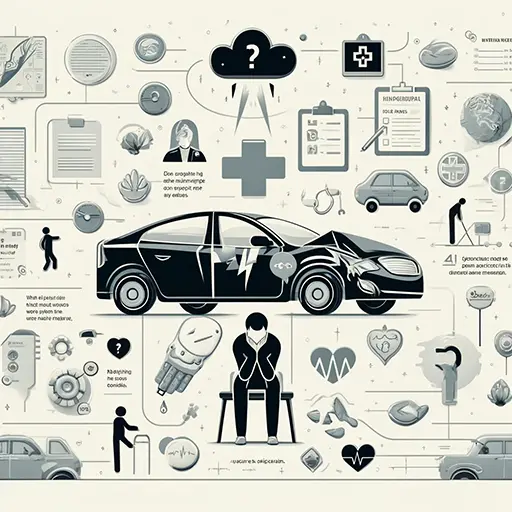After a car accident, the flurry of emotions can be overwhelming. Seeking medical attention should be a priority. However, a surprising number of individuals hesitate or altogether avoid seeing a doctor after a car accident. This stems from a variety of reasons, both psychological and practical. However, understanding these issues can help you not be afraid to see a doctor after a car accident.
Table of contents
1. Fear of Diagnosis
One of the most common reasons people avoid seeing a doctor after a car accident is the fear of discovering a serious injury. The thought of dealing with chronic pain, long-term disability, or even life-altering diagnoses can be challenging. This fear of bad news makes some prefer the uncertainty of not knowing.
Anticipation of Life-Altering Conditions

Many people fear that a diagnosis might reveal severe, life-altering conditions. These could change their way of life permanently. This includes the possibility of chronic pain, mobility issues, or cognitive impairments, significantly altering one’s lifestyle and independence.
Psychological Impact
The mental and emotional toll of dealing with a serious injury cannot be understated. The thought of facing long-term treatment, the uncertainty of recovery, and the impact on mental health are daunting. Many people fear the stress, anxiety, and potential depression that can come with managing a serious injury.
Impact on Family and Loved Ones
Individuals often worry about the burden their injury and diagnosis might place on family and loved ones. Additionally, these concerns range from causing emotional distress to loved ones to becoming a financial or physical burden.
Fear of the Unknown
Beyond the immediate concerns of a diagnosis, there’s a fear of the unknown. Not knowing the full extent of the injury, how it will progress, or what life will look like post-recovery. This fear often leads individuals to avoid seeing a doctor after a car accident.
Social and Professional Repercussions
There’s also the fear of how a serious injury might affect one’s social and professional life. Concerns about being perceived differently, losing job opportunities. Furthermore, not being able to engage in social activities like before can deter people from facing the reality of their injuries.
However, addressing these fears requires a supportive environment, access to clear and compassionate medical advice, and help in navigating the aspects of recovery.
2. Financial Concerns
The financial concerns associated with seeing a doctor after a car accident are a source of stress for many individuals. These concerns can range from the immediate costs of emergency medical care to the long-term financial implications of ongoing treatment and rehabilitation.
Furthermore, the financial aspect of post-accident medical care can be daunting, especially when coupled with the uncertainty of insurance coverage and potential legal issues. Understanding these concerns can help in planning the impact of seeing a doctor after a car accident.
High Costs of Emergency Services and Initial Treatment
The immediate aftermath of a car accident often involves emergency medical services, which can include ambulance rides, emergency room visits, diagnostic tests, and initial treatments. These services can be extremely costly.
Long-Term Medical Expenses
Injuries sustained in car accidents can require extensive follow-up care, including surgeries, physical therapy, medication, and specialist. The long-term nature of these treatments can lead to accumulating medical bills.
Lost Wages and Reduced Earning Capacity
Serious injuries can result in time away from work, leading to lost wages. Additionally, if the injury impacts one’s ability to perform their job as they did before the accident, it can result in a reduced earning capacity.
Insurance Claim Disputes and Delays
Insurance claims can be a complex and time-consuming process. Disputes over coverage, delays in payment, and the potential for claims to be denied can leave individuals facing large medical bills with no immediate means of payment.
Potential Need for Legal Representation
In cases where there is a dispute over fault or compensation, the need for legal representation can arise. Legal fees, coupled with the uncertainty of the outcome, can add to the financial concerns associated with seeing a doctor after a car accident.
Non-Covered Expenses
Often, certain treatments or rehabilitation services may not be fully covered by insurance, or there may be caps on the amount the insurance company will pay. Furthermore, these non-covered or partially covered expenses can lead to significant out-of-pocket costs.
Impact on Personal Savings and Financial Stability
For many, the effect of these expenses can drain savings and impact long-term financial stability. The concern of falling into debt is enough for people who do not want to go see a doctor after a car accident.
On the other hand, addressing these financial concerns requires careful navigation of insurance policies, exploring options for financial assistance, and possibly retaining a personal injury lawyer to ensure fair compensation.
3. Belief in Self-Healing
A significant number of individuals believe in the body’s ability to heal itself without medical intervention. This belief, often bolstered by minor experiences of recovery, can lead to underestimating the severity of injuries. Car accidents can cause internal injuries that might not manifest immediately but can have severe long-term consequences if left untreated.
4. Legal and Insurance Concerns
Not seeing a doctor after a car accident can lead to a range of legal and insurance concerns that might complicate your situation further down the line. These concerns highlight the importance of seeing a doctor quickly after an accident, not just for your health, but also to ensure your legal and financial interests are protected.
Not seeing a doctor after a car accident could cause.
Compromised Insurance Claims
Many insurance companies require prompt medical evaluation to process injury claims. Failing to see a doctor immediately can be interpreted by insurers as an indication that your injuries are not serious, which could lead to a denial of your claim or a significant reduction in the compensation you receive.
Difficulty Proving Injury Related to the Accident
The longer you wait to seek medical attention, the harder it becomes to prove that your injuries were directly caused by the accident. This is particularly crucial in personal injury cases, where establishing a clear link between the accident and your injuries is essential for a successful claim.
Reduced Compensation
Insurance adjusters often use the delay in seeking medical treatment as a reason to argue that an injury was not severe or was pre-existing. This can result in reduced compensation for your injuries, affecting your ability to cover medical bills and related expenses.
Statute of Limitations Concerns
In many jurisdictions, there’s a limited window of time (statute of limitations) within which you can file a claim for your injuries. However, waiting too long to see a doctor can push you closer to this deadline, potentially limiting your legal options and the time available to pursue a claim.
Impact on Legal Strategy
If your case goes to court, the opposing counsel can use your delay in seeking medical treatment as evidence against the severity of your injuries. Additionally, this can undermine your credibility and affect your legal strategy, potentially compromising your case.
Potential for Underestimating Injuries
Without a professional medical evaluation, you may underestimate the severity of your injuries. This can lead to accepting a lower settlement than what might be necessary to cover long-term medical care, rehabilitation, or lost wages.
Challenges in Future Insurance Coverage
Failing to document your injuries properly through medical records can also impact your future insurance coverage. Insurers may view previous undocumented or under-documented claims skeptically, potentially affecting your premiums or coverage limits.
Jeopardizing Personal Injury Lawsuits
In a personal injury lawsuit, not having timely medical documentation can severely weaken your case. Furthermore, medical records are often key evidence in proving the extent and cause of your injuries, as well as the impact they have on your life.
Given these concerns, seeing a doctor after a car accident is not just a matter of health—it’s also a critical step in protecting your legal rights and financial future.
5. Psychological Barriers
Car accidents can have psychological effects that deter individuals from seeing a doctor. The stress and anxiety following an accident can lead to denial, a coping mechanism that allows individuals to avoid dealing with the reality of the situation.
Additionally, some may experience post-traumatic stress disorder (PTSD), which can make the prospect of revisiting the trauma through medical examination unbearable.
Overcoming the Fear of seeing a doctor after a car accident
Overcoming the fear of seeing a doctor after a car accident is a step toward healing, both physically and emotionally. It’s understandable to feel apprehensive about the potential outcomes of a medical examination. However, taking that step is pivotal for your health and peace of mind.
Here are a few strategies that can help you overcome your fear of seeing a doctor after a car accident:
Acknowledge Your Fears
The first step in overcoming fear is to acknowledge it. Understand that it’s normal to feel anxious or scared about possible outcomes. In addition, recognizing your feelings allows you to address them directly and seek the support you need.
Seek Information and Support
Knowledge is power. However, learning more about the common injuries from car accidents and their treatments can demystify the process and alleviate some fears. Additionally, reaching out to friends, family, or support groups can provide comfort and encouragement.
Understand the Importance of Early Detection
Early medical intervention can significantly impact the outcome of your recovery. Understanding that prompt diagnosis and treatment can prevent more serious complications can be a strong motivator to see a doctor after the car accident.
Explore Your Financial Options
Concerns about medical bills can cause unwanted stress. However, many healthcare providers offer payment plans or financial assistance. Additionally, insurance may cover more than you realize. Investigating these options beforehand can ease financial worries.
Focus on the Benefits
Shifting your focus to the positive outcomes of seeing a doctor can also help overcome fear. Furthermore, think about the peace of mind that comes with knowing the extent of your injuries and having a clear plan for treatment and recovery.
Take Control of Your Health
Remember that seeking medical attention is an act of taking control of your health and well-being. It’s a proactive step towards healing and demonstrates your commitment to your recovery.
Start Small
If the idea of a full medical examination is overwhelming, consider starting with a consultation. Additionally, talking to a accident doctor about your concerns can be a less intimidating first step.
Bring a Friend or Family Member
Having someone you trust accompany you to the doctor can provide emotional support and help ease anxiety. Furthermore, they can also help remember information and ask questions you might not think of.
Final Thoughts
In conclusion, while the reluctance to see a doctor after a car accident is understandable, it’s important to prioritize health and well-being. However, overcoming these fears not only ensures a better recovery but also protects individuals from long-term health issues and financial issues. Remember, the decision to see a doctor after a car accident is not just a step towards physical recovery but also a crucial move in safeguarding your future health and financial stability.


